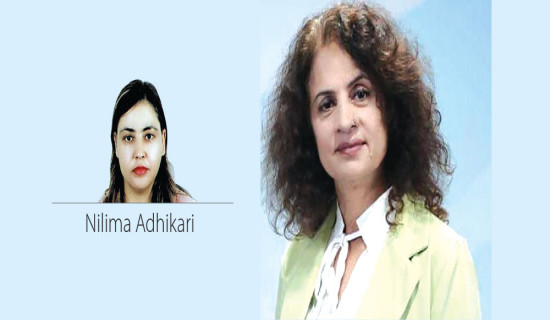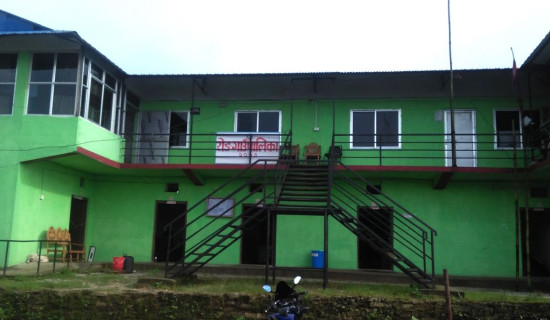- Saturday, 27 July 2024
Memorable Accounts Of A Versatile Academician
Mahesh Kumar Upadhyay, a two-tenure Vice-Chancellor of Tribhuvan University and living witness to over seven decades of changes in Nepal encompassing social, economic, and political realms, has come out with an interesting autobiography depicting his life and public innings spanned over a long time. The book entitled SMRITIKAA REKHAAHARU, which can roughly be translated as Lines of Memory, is divided into 37 chapters and an appendix consisting of an extensive photo gallery.
Upadhyay has the unusually coveted and multi-dimensional credentials of an activist with the orientations of leftist politics, academics, political administrators, and finally educational administrators that few people can have the opportunity to serve during the course of their lives. In a country where ambassadorship is traditionally doled out as a favour on political grounds, with many vice chancellors in the loop for such supposedly gubernatorial assignments, he was supposed to have lost the chance to become ambassador by a whisker. He was, however, asked to go to the United Nations General Assembly once as a delegate, an exercise taken by many as an informal preparation for ambassadorial assignments.
Belonging to the Dahal family of Jhangajholi, now in Sindhuli, before migrating to Karnaul, Muzaffarpur, Bihar, with his family later shifting to Deoghar or Baijanathdham, which currently lies in Jharkhand, the author displays a strong sense of attachment to Karnaul. Upadhyay, the youngest of three brothers, was nicknamed Bhuidolan Babu, meaning earth-shaking boy, as he was born immediately after the mega earthquake of January 15, 1934. He had education at Dinbandhu Pathshala and R. Mitra School before doing his master’s in economics from Gorakhpur, topping the list with short innings in Patna, Varanasi, and Lucknow.
He hails from an enlightened background, with his father, Gopal Prasad Upadhyay, being a double graduate of the prestigious GBB College, Mujaffarpur (later renamed Langad Singh College), and his maternal grandfather, Bharat Mani Acharya Dixit, being one of the pivotal figures of the Rana administration, especially attached to the Chandra Shumshere family, which almost occupied one-third of the total Rana regime that lasted more than a century. Gopal Prasad Upadhyay was a class friend of eminent litterateur Laxmi Prasad Devkota.
Recalling his visit to the Indian parliament as a representative of Pushpa Lal Shrestha, Upadhyay records the names of three veteran Indian parliamentarians with gifted oratory: Atal Bihari Vajpayee, among the best, and two others, Hiren Mukherji and Renu Chakraborty.
Upadhyay depicts political, academic, and other characters who called shots during his time, in addition to many diplomats he came across. As Vice-Chancellor of Tribhuvan University, he served under five Education Ministers, including Ranadhir Subba, Fatteh Singh Tharu, Pashupati Shumshere, Keshar Bahadur Bista, and Parasu Naryan Chowdhury. He calls Bista the most intrusive in his dealings. Subba had a record of being the longest-serving ambassador of Nepal to any one country, as he served in China for almost nine years at a stretch.
In Upadhay's self-reckoning, the anointment of top singer Narayan Gopal Gurubacharya as Honorary Professor on the recommendation of Professor Bishwambher Pyakuryal, with the so-far unique distinction of being both an ambassador and an ambassador's spouse, was an important step he took as Vice-Chancellor. He also lists people who assumed power without responsibility both during Panchayat days and later. He finds pitfalls in both systems, as in his reading, practitioners are possibly of the same mould and plentifully endowed with self-interest rather than national or public interest.
The author gives details of impressions of Dr. Tulsi Giri as having an intellectual and impressive personality, despite earlier assumptions to the contrary. Among the stalwarts on his impressive roll are Krishna Prasad Bhattarai, Man Mohan Adhikary, and Dr. Dilli Raman Regmi.
While this is probably one of the best writings of a vice chancellor, there are some aspects on the negative side that can be discerned after reading the book. One obvious weakness of the otherwise highly readable work is the plethora of mistakes in the form of both proofs and names of individuals that could have been avoided by skilled editing. For example, Governor-General George Hastings is mistakenly referred to as George Washington (p. 25), and Sukhani, the spot where six young activists, including Ram Nath Dahal, were killed, is inadvertently called Sunkhani (p. 64).
There is also confusion (p. 75-76) in the minds of readers as the Bandung Summit held in 1955 (not in 1954) was an Asia-Africa Conference and was surely a precursor of but actually not the First Summit of Non-Aligned Movement (NAM) that was held only in 1961 in Belgrade. Likewise, it is not correct that King Mahendra attended the Bandung Summit, a mistake also committed by a senior diplomat in his memoirs. Supposed to have been earlier led by the Prime Minister, the Nepali team was headed by Foreign Secretary Major-General Shobhag Jang Thapa and included stalwarts like Ram Prasad Manandhar, Yadunath Khanal, Padma Bahadur Khatri, and Naresh Man Singh.
King Mahendra, making significant contributions to the development of Nepal's foreign policy, had actually led delegations to the first three NAM summits held in Belgrade (1961), Cairo (1964), and Lusaka (1970), respectively. Upadhyay quite generously highlights the monarch's defining role on the domestic front in socio-economic, cultural, academic, and international matters.
One more weakness is random style and not systematic presentations. As a diplomat with longer interactions with his elder brother, Shailendra Kumar Upadhyay, alias Rameshwar Babu, as our favourite boss, I personally feel that the author should have given more focus and substantive coverage on the life and role of the eminent diplomat, politician, and Foreign Minister, despite having dedicated a full chapter on him.
Another major lacuna of the book is only passing reference to Dina Nath Upadhyay, who played a critical role in Nepal-East India Company relations as the mercantile company, conceived to be a trading concern, turned into a formidable political and territorial power. I wish the author gave better highlights of the family with a special context of Dina Nath Upadhyay, his grandson Lok Raman Upadhyay, Chandra Sekhar Upadhyay, and others who were directly linked with Nepal's relations with the South, including the settlement of our territorial disputes and bitter negotiations on the finalisation of the Sugauli Treaty.
Despite some weaknesses, there is absolutely no doubt that Upadhyay has rendered a yeoman's service by publishing his memoirs, which can be interesting for a wider cross-section of readers. I congratulate him for his wonderful endeavours.
(Dr. Bhattarai is a former foreign secretary, ambassador, and author.)




-square-thumb.jpg)










